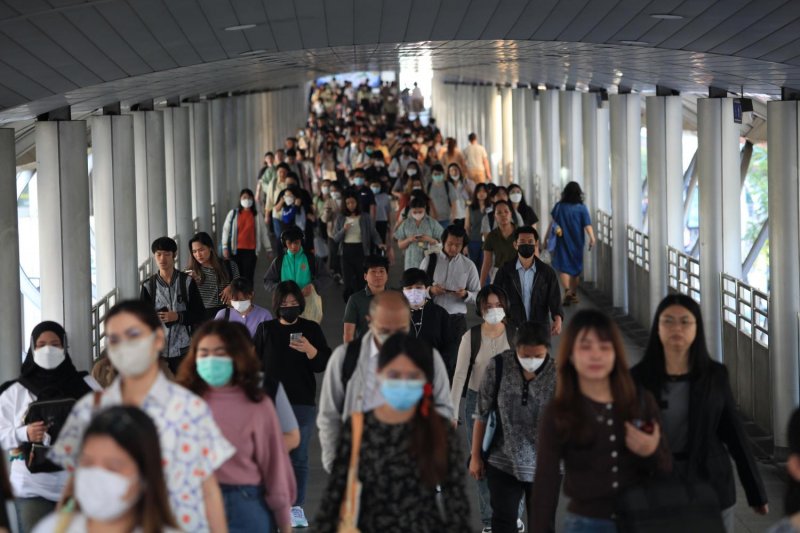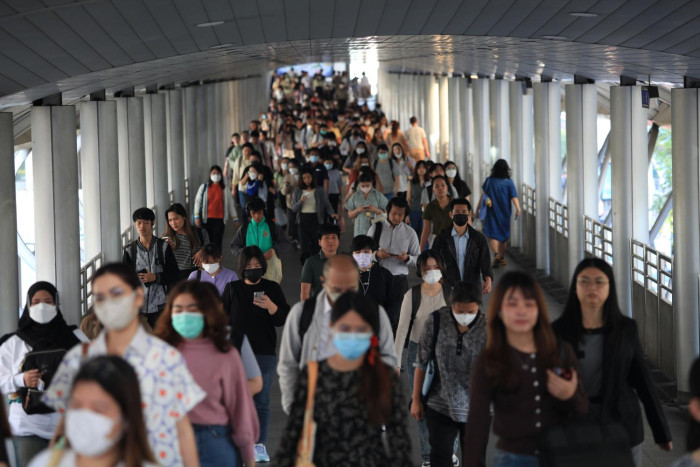
The private sector believes extending the retirement age may be suitable for state agencies, but that does not mean it will work in the business sector, according to an executive. Apichart Jinakul
The country’s working-age demographics are a topic of widespread debate, with Prime Minister Anutin Charnvirakul floating the idea of raising the retirement age from 60 to 65.
His initiative contrasts with the private sector, which recently discussed younger retirement ages for employees to make room for a new generation of workers.
Even though the premier later said this idea remains a concept that still requires discussions with related agencies, this practice is not unusual as Thai courts and prosecutors pilot retirement age schemes of 65-70.
NEW BURDEN
Retirement age extension will add a financial burden for entrepreneurs who are struggling to deal with the sluggish economy, said Isares Rattanadilok Na Phuket, managing director of Altimate Packaging Co.
He said it was fine if the government responds to aged society demographics by applying the idea to state agencies, as the work experience of older officials can be valuable. But this does not mean it will work in the business sector, said Mr Isares.
Many businesses are reducing their financial burdens by offering early retirement packages to their employees. Others need to cut spending on workers’ welfare and unnecessary expenses.
Companies with sufficient funding are eager to replace human labour with artificial intelligence (AI) technology and automation systems.
All are crucial for the growth and survival of businesses, he said.
Some companies may continue to hire employees over 60 as consultants, but these decisions are usually made on a case-by-case basis and only a few capable workers with solid experience are offered these post-retirement jobs, said Mr Isares.
“Applying the retirement age extension proposal on a large scale will certainly affect companies,” he said, adding it raised doubts about the government’s motives.
“The aged society demographic may be an excuse. I believe the government wants to address lower tax revenue collection and birth rates, which is causing a decline in state revenue. This is a problem as the government needs to allocate part of its tax revenue to support welfare and pension programmes for old people.”

RISKS FOR EMPLOYEES
Thienprasit Chaiyapatranun, president of the Thai Hotels Association, said extending the working age to 65 should not be compulsory for the private sector as labourers might be affected.
The hotel industry already offers options for those who are retired, such as extending temporary contracts on a yearly basis if those workers are still capable of working, he said.
If extending employment until 65 becomes mandatory, workers would instead face risks of being laid off if employers consider them to be surplus to requirements, said Mr Thienprasit.
The largest portion of workers in the Thai hotel industry are younger than 50 and mostly employed in housekeeping roles.
Due to the physical workload, those over 50 may no longer be suited for such tasks, unless they can use their experience in higher-level roles, such as supervising housekeeping operations, he said.
The hotel industry continues to attract young workers, but the turnover rate is generally higher than in other sectors, as experienced staff often move to other hotels for better pay, said Mr Thienprasit.
Some European countries have extended the retirement age to allow a longer period of contributions to pension funds, while employers are also required to shoulder the additional costs, he said.
With this approach, the government can postpone pension payments to retirees for a few more years.
However, Mr Thienprasit said the government should be reminded that not every retiree would welcome a later retirement age.
AVOIDING CONFLICTS
Extending the retirement age could help ageing employees feel more financially secure, but it should not cause conflict between different generations, said Buranin Rattanasombat, president of the Marketing Association of Thailand.
Allowing employees 60 and older to continue working may cause misunderstanding among younger generations, who might feel they have fewer job opportunities.
“They may think their jobs are being snatched by the older generation,” said Mr Buranin.
If authorities want to implement an older retirement age, they must clarify how it will benefit Thai society and not damage the labour market, he said.
Mr Buranin said he agrees with the proposed change because it helps the growing number of people in their 60s who are concerned about a sharp drop in their income after retirement.
“Many employees in their 60s have no physical problems, unlike old people in the past. They can carry on working,” he said.
However, these workers may need skills training to adapt to changes in technology and the work environment, allowing for better collaboration with younger colleagues, said Mr Buranin.
“In addition, it may not be necessary for older employees to come to the office every day and work from 9am to 5pm,” he said.

Business sector warns that if authorities would like to extend age limit of retirement to 65 years old, they must clarify how it will bring advantages to the Thai society and not cause negative impact in the labour market. (Somchai Poomlard)
REASONABLE PROPOSAL
Thitima Chucherd, head of economic and financial market research at SCB EIC, a research centre under Siam Commercial Bank, said extending the retirement age to 65 is a reasonable proposal given Thailand’s rapidly ageing society.
She said several developed countries have already raised their retirement age beyond 60, in line with a shrinking workforce, ageing population and the adoption of AI technologies.
Extending the retirement age could also strengthen Thailand’s welfare systems, said Ms Thitima.
The main question is how the policy will be implemented, she said.
EIC recently released its Thailand Labour Market Report, noting the ageing population has become a structural challenge weakening the labour market. Thailand became an ageing society in 2005 and an aged society in 2024, defined as people 60 or older exceeding 20% of the total population.
The working-age population continues to decline over the long term. According to the Public Health Ministry’s 2024 Population Situation Report, Thailand’s population totalled 65,951,179, with only 462,240 births compared with 571,646 deaths, resulting in a negative natural growth rate of -0.17% per year.
The total fertility rate — the average number of children per woman of reproductive age — dropped to 1.0 in 2024, far below the replacement level of 2.1. This indicates Thailand’s population is ageing rapidly, with fewer children being born each year.
The report stated this demographic shift will directly affect the future labour force.
The labour force has been steadily declining, falling to 40.25 million people in the fourth quarter of 2023. Since then, it has continued to decline, contracting on a year-on-year basis.
A World Bank study in 2024 identified Thailand as one of the fastest-ageing countries in the world, with an old-age dependency ratio of 22%, projected to reach 50% by 2050.
EIC noted the old-age dependency ratio is rising due to the increased older population alongside a sharp decline in the working-age population.
As a result, the research house recommends Thailand adjust its workforce through three areas of development: skills, financial and global.
Workers need to acquire diverse new skills and learn to apply new technologies, particularly AI, to lift productivity, according to EIC.
Moreover, efforts should be made to enhance financial literacy on saving, borrowing and investing to help individuals manage their income and expenses more effectively, noted the report.
This would support greater financial stability among workers and within the household sector, according to EIC.
Employees need to adapt their work practices, learning approaches and career paths to meet the demands of the evolving global labour market, added the report.
PHASED IMPLEMENTATION
Dhanakorn Kasetrsuwan, chairman of the Thai National Shippers’ Council, said the private sector views the proposal to raise the retirement age to 65 as beneficial and appropriate, as Thailand has become an aged society with a declining birth rate.
However, the implementation must be done with care and flexibility, requiring supportive policies that ensure fairness and enhance effectiveness, he said.
The private sector recommends a phased approach, starting with industries that are ready, and setting different retirement ages based on job types, industry risks and employee capabilities, said Mr Dhanakorn.
To address employment conditions, he proposed offering flexible options, such as part-time roles, project-based employment, or reduced working hours depending on individual capacity.
Skills training programmes are crucial to help older workers maintain productivity and capabilities, said Mr Dhanakorn.
In terms of compensation and welfare, he suggested adjusting pay structures to match workloads and age, providing specialised health support, and offering tax benefits or incentives to employers who hire older workers.
Regarding the social security and pension system, Mr Dhanakorn proposed revising the contribution and payout criteria to align with the higher retirement age, expanding coverage to include informal and non-registered workers, and ensuring fund sustainability through efficient asset management.
Finally, he called for supportive laws and policies, including anti-age discrimination laws, clear employment standards for older workers, and the integration of data analysis and research for policy improvements.
These initiatives should create an environment where older workers can continue to work productively and support the government’s goal of achieving long-term national sustainability, said Mr Dhanakorn.
Arnupharp Kongmalai, vice-president of marketing for MR. D.I.Y. Holding (Thailand), said despite the country’s rising elderly population, the company does not have a special programme to hire them.
He said such a policy could be considered for future employment opportunities.
The company employs around 10,000 individuals, and most of them are younger workers. MR. D.I.Y. also hires people with disabilities to work at its stores, said Mr Arnupharp.

